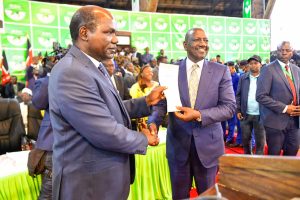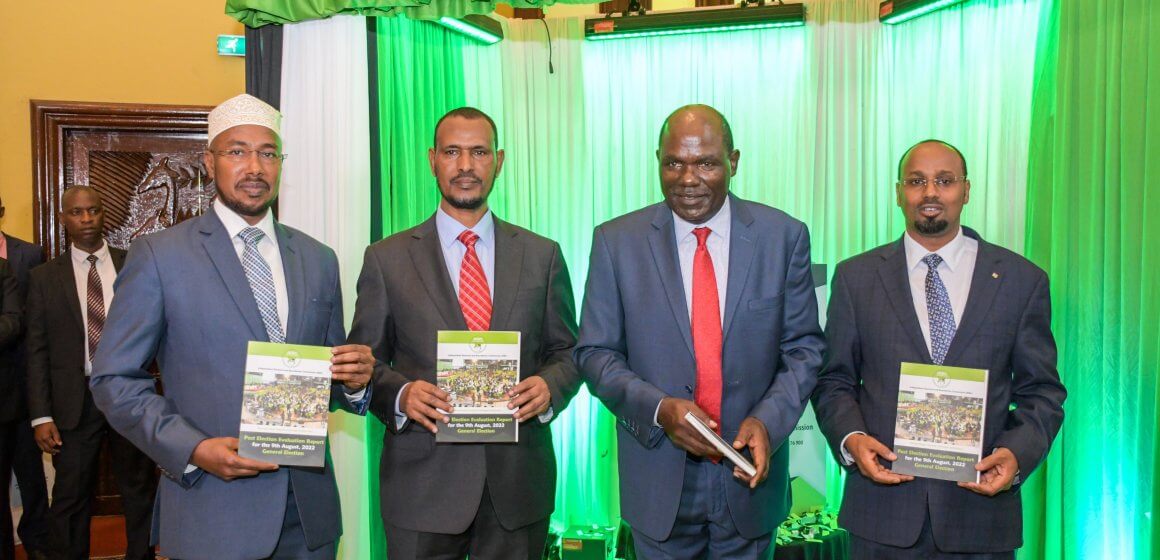|
LISTEN TO THIS THE AFRICANA VOICE ARTICLE NOW
Getting your Trinity Audio player ready...
|
Kenya needs to act fast and replace the outgoing Independent Electoral and Boundaries Commission (IEBC) Chairman and commissioners to avert a vacuum in the electoral body.
IEBC Chairman Wafula Chebukati and commissioners Boya Molu and Abdi Guliye left office on January 17, having served a six-year non-renewable term.
Chebukati, the Commission’s chair for the last six years, was appointed head of the IEBC on January 18, 2017. Chebukati said he served the country according to the law and described his colleagues as true heroes.
“It was undoubtedly a challenging assignment, but I served my country to the best of my ability and in accordance with the oath of office I took,” he said.
To the incoming Commission’s new staff, he said: “fidelity to the law is the key to success at IEBC.”
Boya said it was a privilege to serve Kenyans at the Commission.
“To the people of Kenya, We thank you for the privilege to serve you in this Commission. We leave content that we gave it our best shot under the circumstances,” he said.
Guliye said he leaves the Commission satisfied and with no apologies to anybody.
“We upheld our oath of office and the rule of law at all times. As I leave office, I am satisfied that I did my best for my country and my people,” he said.
The other former commissioners: Juliana Cherera, Justus Nyang’aya, and Francis Wanderi, resigned in December 2022 after President Ruto suspended them from office so they could be investigated for their conduct during the August 2022 election. Of the Cherera 4, Irene Masit is the only one who opted to defend herself. She remains suspended, still.
The three commissioners resigned after a Parliamentary Legal Committee inquiry recommended their removal from office over alleged gross violations of the constitution during the August presidential elections.
The three, together with Masit, comprise the four IEBC commissioners who had refused to approve Ruto’s win, citing a lack of transparency in the vote tallying process at the Bomas.
SERVING UNDER TRIALS AND TRIBULATIONS

Bomas, IEBC’s national tallying center in the August general election, had fracas pitting the opposing sides— William Ruto’s Kenya Kwanza and Raila Odinga’s Azimio la Umoja One Kenya. The Cherera 4 commissioners opposed the result that endorsed Ruto’s win. At the same time, the other commissioners— Chebukati, Guliye, and Molu approved the same results, thus causing a melee that saw diplomats, observers, and other high-profile guests run for dear life.
“It has been six years of trials and tribulations. We recall the clean-slate slogan in the BBI, meaning the entire IEBC commission (had to go), but it didn’t come to pass. We recall the Bomas drama. Some objects were flying left, right, and center, and some even injured us,” Guliye said during his exit speech.
Eventually, the three commissioners declared Ruto the winner, a victory Odinga unsuccessfully challenged in court. Ruto’s victory was thus rubber-stamped by the Supreme Court.
Ruto has since heaped praise on Chebukati, who he often refers to as a hero, for handing him the presidency. He says that it’s by Chebukati and the three commissioners’ strong stand that the people’s will prevailed at the Bomas.
During the farewell speech from the commissioners, President Ruto alleged that there was a plan to abduct and kill Chebukati.
“We know that there was a direct attempt to abduct Wafula Chebukati and murder him so that the commission would be paralyzed, or a compliant commissioner take over and subvert the people’s sovereignty,” Ruto said.
Chebukati himself asked the President to institute an inquiry into the events that happened at the Bomas to strengthen democracy and protect the reputation of the Electoral Commission.
“The gravity of these attempts to subvert the will of the people cannot be wished away or swept under the carpet because they might re-emerge in the future,” Chebukati said.
“It (the inquiry) will enable a future election environment devoid of manipulation, profiling, and harm of commission staff while discharging their duties,” he added.
The Commission’s tenure technically ended on Tuesday— the day the remaining three commissioners completed their term. There was a need to recruit new commissioners to avoid a constitutional crisis.
Section 7A (2) of the IEBC Act states that the President shall declare a vacancy in the Commission within seven days of the occurrence of a vacancy in the office of the chairperson or a member of the Commission.
The national assembly sponsored the IEBC amendment bill 2022. The proposed Bill, accepted by the senate without any amendments, seeks to introduce two new nominating bodies to name representatives to the seven-member selection panel that will recruit new commissioners.
The Bill recommends the Parliamentary Service Commission nominate one man and one woman and the Inter-Religious Council two slots. Meanwhile, the Public Service Commission, Political Parties Liaison Committee, and the Law Society of Kenya will each nominate one person to the IEBC selection panel. The panel thus constituted will recruit the new commissioners.
Opposition leaders in the national assembly unsuccessfully opposed the Bill. John Mbadi, a nominated MP and the ODM Party chairman wanted new commissioners to be recruited based on the existing provisions of the law.
“Unless there is a motive behind this Bill, the President should use the law already in place for the process of recruiting new commissioners to start,” Mbadi said.
Minority leader Opiyo Wandayi said the new Bill was a precursor to a Ruto-obedient electoral agency and said Kenyans would fight it.
“This is the electoral body whose members President Ruto has presented to Kenyans as heroes. Reform is a must, and any attempt to unilaterally reconstitute the IEBC will be vigorously resisted by all patriotic forces,” Wandayi said.
Meanwhile, the Azimio team is far from over in its “quest for truth” about the results of the presidential elections.
January 19, on a Thursday afternoon in Nairobi, the Azimio leaders led by Kalonzo Musyoka and Martha Karua said that a new report from an IEBC whistleblower shows that Raila Odinga and Martha Karua, the coalition’s presidential candidates won the 2022 August election.
They asked IEBC to open its servers for a forensic audit to get the truth on the votes garnered by both Odinga and President William Ruto.
“This is the data that we asked for in court, but IEBC deliberately sat on it, and they were supported by the courts, but finally, the truth is out,” Karua said during the coalition’s press conference on Thursday in Nairobi.
“We have been saying that we won the August poll, and now the figures from the whistleblower reinforce what we have been saying,” she added.
Jeremiah Kioni had the previous day said that from the report presented by the whistleblower, Odinga won the election with eight million votes.
“59% of the constituencies examined showed results that can’t be verified with absolute certainty, but again, in the same document, what has been verified so far shows that Raila won with 8,170,355 votes (57.53%) of the votes cast. Ruto got 5,915,973 votes (41.66%),” Kioni said.
News about the whistleblower has brought back allegations that Chebukati favored Ruto and revived charges that the last presidential election was rigged.
Unless there is a compromise, the appointment of the new IEBC Chairman and commissioners could be a divisive issue that could create a political and constitutional crisis in Kenya.





























